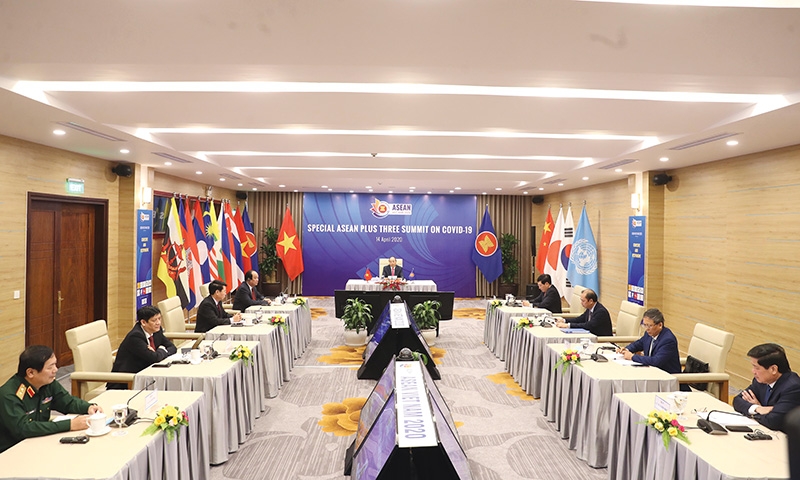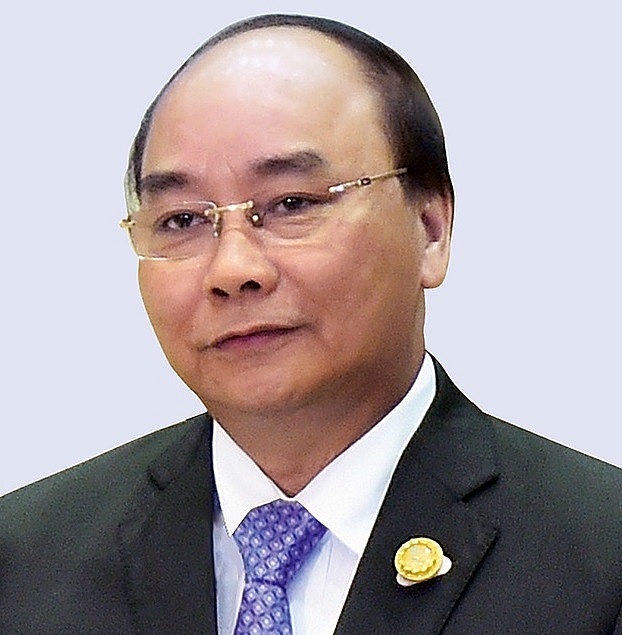ASEAN member states remain united amid health emergency
 |
| The special ASEAN and ASEAN+3 summits on COVID-19 were hosted entirely online by Vietnam |
Leaders of the ASEAN member states and its three partners of China, Japan, and South Korea last week agreed to transparently exchange real-time information on the situation on the ground and measures taken by each country in combating COVID-19, as well as promoting mutual technical support in the prevention, containment, and control of transmission as well as clinical treatment of infected cases.
The commitment was made at two historic video summits, the Special ASEAN Summit on COVID-19 and the Special ASEAN+3 Summit with China, Japan, and South Korea on COVID-19. The summits were hosted by Vietnam as chair of the ASEAN.
In the context of the pandemic, the commitment is aimed to prioritise the wellbeing of people, and assisting both people and businesses suffering from the impacts, especially micro-, small- and medium-sized enterprises and vulnerable groups.
| Prime Minister Nguyen Xuan Phuc Chairman, Special ASEAN and ASEAN+3 summits on COVID-19
The COVID-19 pandemic is the greatest challenge to humankind and an unprecedented global crisis since the Second World War, and also the biggest challenge to the ASEAN during its more than half a century history of formation and development. All member countries are forecast to suffer from a strong decrease in growth, and some will even face an economic decline. Regarding ASEAN co-operation, statistics of the ASEAN Secretariat showed more than 200 meetings of the bloc had to be postponed or cancelled. From the beginning of this year as chair of the ASEAN, Vietnam, together with other member countries, has actively and urgently made preparations for and got ready to organise activities during the ASEAN Chairmanship Year 2020. However, with the sudden outbreak of the pandemic and its unprecedented impacts in all fields, we had to make necessary adjustments to the plans for those activities. With the motto of putting people’s health first, and maintaining connectivity and close co-ordination in preventing and fighting the epidemic, ASEAN member countries have organised many important ministerial-level meetings in the form of video conferences, as well as meetings with partners such as China, the EU, the US, and important international organisations like the World Health Organization to share experience and help for the effective response to the epidemic. We will continue to consider holding important ASEAN events when the epidemic is put under control. Vietnam earlier issued an ASEAN chair statement on the bloc’s collective response to COVID-19 and held many important meetings among member states and between the group with its partners to ensure concerted co-ordination in epidemic prevention, and to share experience and support to effectively cope with the pandemic. If we unite, no danger can subdue us. The pandemic has proven that Vietnam’s theme “Cohesive and Responsive” for its ASEAN Chairmanship Year 2020 is timely and correct. Efforts by Vietnam as ASEAN chair have reflected the spirit of the theme and shown that Vietnam has turned words into actions. The way we are working together to tackle the pandemic will reaffirm the strength of the grouping. |
“[We will] intensify co-operation for adequate provision of medicines, essential medical supplies and equipment, including but not limited to diagnostic tools and personal protective equipment; and encourage the development of regional reserves of medical supplies as well as utilising relevant ASEAN reserve warehouses to support the needs of member states in public health emergencies,” read the declaration of the Special ASEAN Summit on COVID-19.
Meanwhile, a joint statement of the Special ASEAN+3 summit reaffirmed “commitments to keep markets open for trade and investment, and enhancing co-operation among the ASEAN+3 countries with a view to ensuring food security, such as utilisation of the Emergency Rice Reserve, and strengthening resiliency and sustainability of regional supply chains especially for essential goods such as food, commodities, medicines and medical supplies.”
It continued that this would be carried out through smooth and continued operation of logistics networks, while ensuring that measures deemed necessary for public health emergency response are targeted, proportionate, transparent, and temporary, while not creating unnecessary barriers to trade or disruption to regional supply chains, and are consistent with World Trade Organization rules.
The leaders of the ASEAN and its partners vowed to “strengthen efforts to stabilise the manufacturing and supply of essential goods and services, including vital medical supplies, critical agricultural products, maintaining necessary flow of goods and services, and sustaining supply chain connectivity within the region and beyond.” This will be achieved by making the supply chain more resilient, sustainable, and less vulnerable to shocks in order to support economic development, reaffirming commitments described in the joint leader’s statement on the Regional Comprehensive Economic Partnership released in 2019.
Particularly, the statements also pointed out the necessity to encourage the development of a post-pandemic recovery plan to share lessons learned and restore connectivity, tourism, normal business, and social activities, while preventing potential economic downturns.
Highly appreciating the success of the meetings, Singaporean Prime Minister Lee Hsien Loong said that the declaration has shown the unity of the ASEAN region. According to him, as an area of 600 million people with four of the world’s 10 busiest air routes and two of the world’s busiest land crossings, each ASEAN country cannot be truly safe unless the entire region is safe.
“COVID-19 is the gravest public health crisis that mankind is facing in a century. It’s critical for us in the ASEAN to mount a united response because of how connected and interdependent our countries are,” he stated.
He also emphasised that the agreement of participated countries in the meetings on keeping trade flowing is important. “Many of us also export goods and agricultural products overseas. Closing our borders completely would therefore only deprive us of goods and products that we can produce together, hurting our economies and worsening unemployment,” he said.
Meanwhile, Indonesian Foreign Minister Retno LP Marsudi stressed the importance of implementing the results of the meetings. “I believe that through efforts to strengthen collaboration and a co-ordinated response in the region, we can win the war against COVID-19,” she said.
Expressing satisfaction with the result of the summit, Japanese Prime Minister Abe Shinzo told the press that it is crucial for every country to keep trade routes open, especially for medical supplies and important goods, despite the pandemic. “The establishment of an ASEAN centre for infectious diseases would be financed by the Japan-ASEAN Integration Fund,” he said.
Meanwhile, Ambassador of South Korea to the ASEAN Lim Sungnam told the media, “The G20 and the EU have held their summit meetings to discuss the impact of COVID-19 and the way forward. The ASEAN+3 were also one of the first to do so online, along with videoconferences to talk about the impacts and joint solutions for the problems. And these joint solutions have been very meaningful steps forward in our efforts to eradicate COVID-19,” he said.
According to the Vietnamese government, the summits demonstrated the highest level of political commitment to solidarity and co-operation within the bloc as well as with partners amidst the pandemic. Individual efforts need to be reunited, becoming a joint action, it said. Timely response and close co-ordination in policy and action among the whole ASEAN bloc and its partners will be the decisive factor in containing the epidemic.
Deputy Prime Minister Pham Binh Minh said, “Given its centrality in the region, ASEAN provides a common shelter for its member states to weather the storm. Throughout our history of development over the past five decades, whenever challenged or faced with a crisis, we emerge stronger. This time is no different. The ASEAN shall continue this time-tested value and fulfil its mission to support its member states during these circumstances of utmost hardship.”
According to DPM Minh, ASEAN does not stand apart from the world, with the wellbeing of people and performance of economies closely linked to the East Asian region and the rest of the world. “Countries in our region have all suffered severe consequences from COVID-19. Vietnam, as the ASEAN chair, has reflected the spirit of cohesiveness and responsiveness,” he added. “With the unity among ASEAN member states and the support and close co-operation of partners, Vietnam is confident that the region will join the world to emerge triumphant from this pandemic.”
Over the last three months, the pandemic has caused devastating losses of human health and life as well as social and economic aspects, which are predicted to far surpass the impact of the 1997 financial crisis in Asia or the global crisis in 2008-2009.
By now, all countries in the ASEAN region have endured COVID-19 infections.
What the stars mean:
★ Poor ★ ★ Promising ★★★ Good ★★★★ Very good ★★★★★ Exceptional
 Tag:
Tag:
Themes: Drive ASEAN Forward
Related Contents
Latest News
More News
- Japanese business outlook in Vietnam turns more optimistic (January 28, 2026 | 09:54)
- Foreign leaders extend congratulations to Party General Secretary To Lam (January 25, 2026 | 10:01)
- 14th National Party Congress wraps up with success (January 25, 2026 | 09:49)
- Congratulations from VFF Central Committee's int’l partners to 14th National Party Congress (January 25, 2026 | 09:46)
- 14th Party Central Committee unanimously elects To Lam as General Secretary (January 23, 2026 | 16:22)
- Worldwide congratulations underscore confidence in Vietnam’s 14th Party Congress (January 23, 2026 | 09:02)
- Political parties, organisations, int’l friends send congratulations to 14th National Party Congress (January 22, 2026 | 09:33)
- Press release on second working day of 14th National Party Congress (January 22, 2026 | 09:19)
- 14th National Party Congress: Japanese media highlight Vietnam’s growth targets (January 21, 2026 | 09:46)
- 14th National Party Congress: Driving force for Vietnam to continue renewal, innovation, breakthroughs (January 21, 2026 | 09:42)






















 Mobile Version
Mobile Version